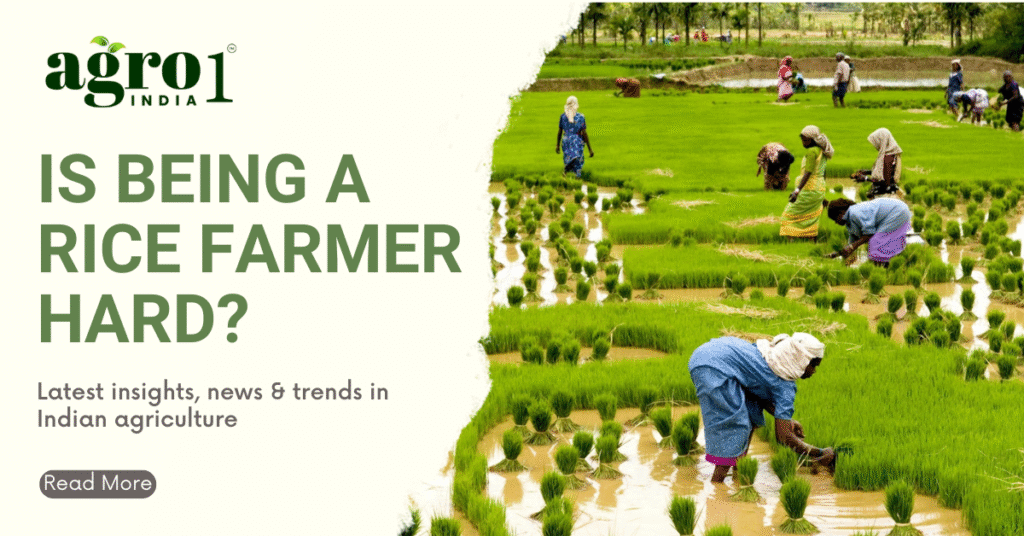When you think of a rice paddy, what pops up in your mind is probably serene green fields, a farmer in the field, and a scene of peaceful simplicity. It may all sound great, but the actual reality of being a farmer is far from great, as it’s much more complex and challenging. So is being a rice farmer hard?
Land and Climate
Rice farming is linked to land and water, which opens up to a numerous challenges:
Extreme Weather: Apart from water, farmers often have to face the challenges of typhoons, droughts, excessive heat or cold temperatures, which can destroy an entire harvest in days or hours. There is little to no control over these and can cause a big financial strain.
Soil Health and Pests: Caring for the soil requires continuous efforts. Frequent cultivation can consume a lot of nutrients, which needs proper care and management, which can be costly. Additionally, rice paddies are known to attract pests and diseases like insects, rodents, fungi, and bacteria that harm yields and lead to the use of pesticides.
Water Management: Rice requires a lot of water. Farmers must be sure to manage their irrigation system well, and make sure there is sufficient water for growth, but not too much that the rice gets ruined. The farmers have to continually monitor, divert water from one field to another, and deal with lack of rain or too much rain.
Labour-Intensive
A large section of rice farming, especially in many parts of Asia, rely heavily on labour, despite advancements in technology.
Post-Harvesting Processing: Drying, threshing, winnowing, and storing rice demand significant time, effort, and proper facilities to prevent spoilage and maintain its quality.
Plowing: Plowing and preparing land can be difficult. Animals and the use of small machines are used to create muddy conditions for rice seedlings.
Transplanting: Despite mechanisation, transplanting rice seedlings by hand from nurseries to rice paddies remains the norm.
Weeding: Weeds require as much nutrients and sunlight as rice. Therefore, it needs constant weeding, which is done manually.
Harvesting: Harvesting involves cutting with sickles, stalk by stalk, and combing harvesters, which is often done manually. Despite machinery, a large amount of physical labour is needed for gathering and processing the grains.
Economic Pressures and Market Volatility
Along with physical labour, farmers have to face economic obstacles:
- Resources: In developing regions, farmers lack access to credit, modern farming techniques, agricultural extension services, and credible market information, worsening their hurdles.
- Market Prices: The price of rice has a tendency to fluctuate a lot, which is influenced by global supply and demand, policies, and trading. Farmers don’t usually have control over how much they earn for their crop.
- Limited Bargaining: Farmers are victim to unfair pricing when they sell their produce to large corporations, with no bargaining power.
- High Costs: Seeds, fertilisers, pesticides, machinery fuel, and labour present high upfront investment costs.
The Unseen Cost
Being a rice farmer does not just involve physical and financial hardships. It also has an intangible toll:
- Stress: The continuous worry about weather, pests, prices, and the physical exertion can lead to unhealthy amounts of stress and anxiety.
- Isolation: Farm work is often solitary and needs long hours, especially during harvesting and planting seasons.
- Modernization: Traditional knowledge is invaluable, but a constant debate between traditional and modern methods arises and the need to adapt to new technologies to further improve sustainability and yields.
Is it Bad?
Of course not! Despite there being hurdles, people all over the world commit to rice farming. Farmers have a deep bond with their land, and take great pride in feeding their communities, strengthened by a strong family of farmers.
Nevertheless, it’s important to know that being a rice farmer is hard. It requires resilience, patience, an understanding of nature, and significant physical and mental strength. So when you savour your next rice dish, remember the hard work and dedication that brought it to you.
Also Read


